|

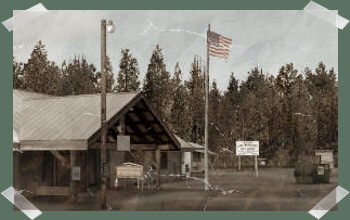
The
setting:
July, 1943…a grass-strip airport somewhere in the US
mid-west…
“Anything for me to do today, Mr. Simmons?”
The man looked up from the workbench where he was
cleaning a well-used carburettor. He squinted against the
bright, late morning sunlight streaming in the open
hangar door behind the boy who had spoken. He didn’t
answer right away, but made a show of picking up the
cleanest of the rags that littered the bench top and
wiping the solvent from his hands.
As he stepped around the end of the bench, limping just
a little on his game leg, a half-dozen thoughts went
through his mind. He considered the boy. About 13 years
old, he was – straight hair, a light brown, but
sun-bleached almost blonde. It was too long, several
weeks beyond needing a haircut. Tommy Harnott was his
name, the only child of the couple who owned the small
farm that lay about three-quarters of a mile up the
dusty gravel road from the airport buildings. He knew
the boy’s dad was off somewhere, caught up in the draft,
or maybe had volunteered to serve in the Army. Only the
boy and his mom were there now.
The place wasn’t being farmed this year, though there
was a big garden behind the house and the small orchard
was bearing fruit. Jim supposed that the farming was
just too much for the woman and the boy to do alone and
there weren’t any men around for hire, able-bodied or
otherwise. They seemed to be getting by none the less.
He supposed that the government must be sending some
money from the absent man’s military pay.
Simmons was the owner and operator of the airport, such
as it was, the only one for nearly twenty-five miles. It
wasn’t much. General aviation was all but dead with the
war on. If it weren’t for the aviation needs of the two
manufacturing plants in the nearby town he’d have lost
the field to the bank months ago. The companies were
doing war work, however, and were expanding as fast as
they could find people to fill the new jobs.
Both companies kept aircraft at the field for the
businessmen to shuttle back and forth to Washington for
contract talks and meetings, or for similar reasons to
the plants of suppliers or of their own industrial
customers. They paid rent for the wood frame hangars
where they kept their aircraft, two for one outfit, one
for the other. They bought some of their gas here, when
he could get it for them, and allowed Simmons to tend to
the maintenance of their aircraft. It was enough.
The boy was a regular at the airport. He’d been hanging
around at the fence line ever since he was old enough to
be out by himself. There weren’t too many other kids
nearby – the farms were far apart here, most much larger
than the Harnott place. Over the last couple of years,
Tommy and Jim Simmons had developed a sort of
friendship; not close or familiar, just an unspoken
mutual understanding. Jim had begun to ask Tommy to help
him from time to time with the occasional chore he
couldn’t handle alone– lifting something awkward,
holding the other end of a long part that needed
attention – that kind of thing. Before long he’d begun
to offer the boy odd jobs, painting, mowing or chopping
weeds, mostly, and paying him a little for doing them.
This summer, Tommy had done most of the mowing out on
the strip and around the hangars and the small office.
“I don’t have much today, Tommy. I do need a lift to get
this crankcase up on the bench, if you can manage that,
though”, he said indicating the shell of a Ranger engine
resting on wood blocks on the floor. It looked forlorn
and empty without its cylinders and other appurtenances.
“OK.” The two bent to the task and in a few seconds the
big aluminium casting rested on the bench, ready to be
cleaned up and prepared for re-assembly. Simmons thanked
the boy for the help, then turned back to the
carburettor. The boy drifted out the open hangar door to
stand in the shade next to the building, looking at the
sky.
Far off to the south the boy's keen eyes picked out a
black dot, low on the horizon. As he watched, it grew
bigger, clearly approaching. Something was odd about it.
The boy was used to the business twins that came and
went from the field, but he seldom saw anything else
these days, at least not low or close. This was
definitely not one of those.
“Mr. Simmons, is a plane coming here today”, he called
over his shoulder.
“No, not that I know of”, replied the man, not looking
up from the intricate parts he was working over.
Over the next couple of minutes the plane slowly
resolved itself into something big enough for some
details to become visible. It had a low wing, four
engines and a huge vertical fin. Only one thing looks
like that, he thought. A B-17 – it had to be! Nothing
else he knew of looked remotely like it. But something
wasn’t right. As the plane came closer, Tommy could see
that there was a problem. One wing was low, and the two
engines on the opposite side were not turning. It was
coming here alright, but it was coming on only two
engines.
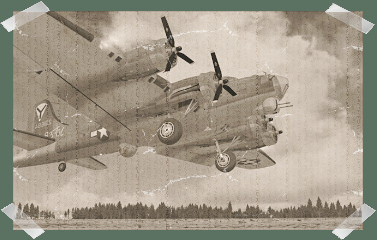
It was
near enough that he could hear the engines now, running
hard as the pilot held the big plane in a maximum effort
slip to counteract the asymmetric thrust. It made its
way toward the field in that peculiar skewed attitude
indicative of hard cross-controlling – ailerons banking
it one way, full opposite rudder preventing the turn.
The big Boeing was crabbing in, losing height as it
came. It was too low and getting lower - too fast for
the strip, but not daring to slow or lower flaps or gear
– yet.
He held his breath watching the arrival unfold. At what
seemed to be the last possible second the landing gear
started down, and the flaps. The gear came all the way
out, barely; the flaps didn’t have time to get even half
way. An instant before the landing gear touched down,
having cleared the low wire fence at the south end of
the strip by a few scant feet, he heard the roar of the
two engines diminish. The nose began to rise a little
and the plane started to straighten itself to align more
closely with the broad grass runway. The low wing on the
port side rose slowly, ponderously, but never got near
to level before the left main gear slammed down onto the
grass, throwing dust and chunks of turf and forcing the
wings level as the other wheel came down equally hard.
Skidding for a heartbeat on the misaligned landing gear,
the big plane then bounded back into the air a foot or
two as the landing gear struts recoiled, before settling
again. It skidded again, but came straight as the pilot
stood on one rudder pedal, then, as soon as it was
tracking straight, on the brakes. It ate up the
remaining strip swiftly, slowing all the while, but
still lumbering on at a good rate. It was rapidly
approaching the end of the strip where the buildings
stood off to the right side. At the end, there was
another wire fence, with a deep drainage ditch and a
dirt road just beyond.
Just as it seemed that a disaster was inevitable, the
bomber turned sharply, hauled around brutally in a
seemingly impossible turn to the right by the right
brake and the left engines - responding to throttles
suddenly pushed open for a few seconds. It skidded
through the turn, throwing up clods of dirt from the
tail wheel and the main gear on the side away from the
buildings as it turned toward them. The turn, almost a
ground loop, sapped most of the remaining momentum from
the big juggernaut and it bumped the final hundred feet
over the rough sod toward the buildings and coasted to a
stop, looking just as if it had been parked there
intentionally. The big Perspex nose was thirty feet from
the front of the maintenance hangar, pointed slightly
skyward.
At some point before that Jim Simmons had come limping
from the hangar as fast as he could manage when he’d
heard the approaching engines. He stood next to the boy,
mouth agape, as the two port-side engines wound down and
clattered to a stop, magneto impulse clutches clicking
out the dying cadence.
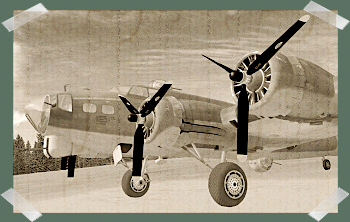 |
From the belly just forward of the wing, a squarish
hatch dropped open on a hinge and men began to emerge.
As one after another dropped out of the hatch, Tommy and
Jim Simmons watched the pilot and co-pilot through the
cockpit windows, shutting down systems, then removing
bulky headsets and getting out of their seats. The
co-pilot looked shaken, the pilot unruffled and
confident. The tail gunner came up beside the plane,
having come out at the rear from his own private exit.
The men grouped up on the grass, ignoring the civilians,
chattering about the wild landing. |
The pilot descended from the hatch last, making a total
of ten, four of them officers. He was wearing the silver
oak leaves of a Lieutenant Colonel. A tag on the front
of his flight jacket said, “Elliot”. He gathered the men
around him. The co-pilot, still looking very much like a
man who‘d just gotten a glimpse of the hereafter and
didn’t wish to go there yet, hung back a half step
behind the colonel’s right shoulder, staying out of his
direct view.
“OK, men, let’s get this sorted out. We have a schedule
and we need to get back on it. We’re due to be in
England in three and a half days, and I still intend to
be on time. Let’s take stock and see what we need to do
to make that happen.
Sergeant Weiderczyk, were you able to get off the
message I requested”
“Yes, sir” answered a man, one of several with three
stripes on their sleeves, obviously the radio operator.
“Acknowledgement?”
“No, sir, not that I picked up. I don’t know if they got
it or not. I sent it blind, three times.”
The Colonel turned to the man and the boy who stood a
few feet away. They were staring at him with wide eyes,
hardly blinking, still coming to grips with what was
happening. “Got a phone here, mister” he asked.
Jim replied that there was, in the office. He pointed to
the small building a hundred feet away. The colonel
turned to the radio operator and directed him to get on
the phone and to make contact with their base, letting
them know that they had landed safely, but that
technical assistance might have to be flown in.
The sergeant answered with a curt, “Yes, sir”, and moved
off to do the Colonel’s bidding.
Turning to one of the officers, the aircraft commander
said, “Mister Murphy, you remain entirely responsible
for that Norden bombsight. I want it covered and I want
you next to it, awake, with your sidearm, at all times.
You will have no other duties while we remain here. If
you need a relief for a latrine trip or anything else, I
want another armed officer in your place until you
return. Understood?”
“Yes, sir.” Off he went, re-entering the aircraft.
And so it went. The navigator was detailed to determine
their exact location. Once having done so, he, along
with the radio operator, was to relay it by telephone to
the Army Air Corps authorities, along with any
additional information regarding their situation that
might be available by then. The navigator was soon at
the workbench in the hangar, head-down over a chart, in
deep conversation with Jim Simmons.
Turning to a grizzled looking sergeant who appeared a
little older than most of the rest of the crew the
Colonel said, “Well, MacKinnon, you’re the flight
engineer. What are your thoughts?”
“I’ve been thinking about it, Colonel. They went rough
just seconds after we switched tanks. They got lean,
then quit pretty quickly – just a minute or two, as you
know, sir. Switching the tanks back again didn’t help.
It’s only 3 and 4 that are affected. I’d say we have
contaminated fuel – more likely dirt than water, but
maybe some of both. When they were fuelling us early
this morning we got the last of a truck full on the
starboard side and then another truck filled the rest of
the tanks. I’d bet the starboard side fuel is dirty, and
the strainers are probably blocked solid too. Nothing
else seems to fit the facts.”
“What does it take to put that right, Mac, remembering
we’re out in the boondocks here?”
The sergeant thought for a few seconds – you could
almost hear the gears turning. “It can be done, Colonel,
but we’ll need a pump of some sort that can handle
gasoline safely, some hose or tubing and a filter or a
good fine strainer. A filter would be best. There’s too
much fuel involved for a hand pump. We need to empty the
dirty tanks, either into drums or some other kind of
receptacle. After we clean the strainers, we can pump
some or all of it back in straining or filtering it
clean as we go. I’d like to follow the first draining by
flushing the dirty tanks with more fuel, then draining
again, before we refill ‘em the final time. If we can
come up with a pump, a filter, some plumbing and
containers, we ought to be able to pull it off.”
“OK, Mac, carry on with it. You can use all the enlisted
men except Weiderczyk. Mr. Evans…”, he gestured to the
co-pilot, without turning to face him, “…will oversee
the work on the aircraft. Let him know if there’s
anything you need that you can’t work out on your own,
and in any case, keep him up to date on how things are
going. I’m sure that fella’ from the airport will help
with whatever he has available, particularly when we
tell him he can bill Uncle Sam for whatever we use. Oh,
and as of right now, I don’t want anyone smoking within
a hundred feet of this aircraft. This is a fuelling area
now and will remain so until you’re done and everything
is restored. Clear?”
“Yes, sir.”
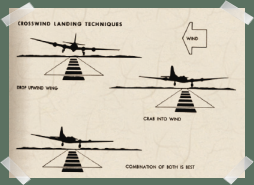 |
As the sergeant gathered the rest of the men and began
to work out their plan, the Colonel turned to the
co-pilot, grabbed him by the elbow and steered him away,
none too gently, out of earshot of the others. He turned
then to face the man.
“Captain Evans, you weren’t much help to me on that
approach. I was a little too busy trying to not lose the
ship and these men to enter into a debate of the merits
of bailing out.” |
The captain cast his gaze down to the ground, then
looked up into the Colonel’s piercing brown eyes. “Yes,
sir”, he said, “I apologize for what happened. It’s just
that I’ve never been so scared in my life. I have no
idea how you made it to this field. That ship is not
supposed to be able to fly like that. Colonel, I’ve been
an instructor pilot on the B-17 for the last five
months. I’m supposed to be an expert on what it can and
can’t do. If I hadn’t witnessed what just happened with
my own eyes I would not have believed it was possible. I
thought for sure…no, I knew…I knew we were going to
stall and spin in, or roll inverted or just come down
short. With the gas we’ve got aboard we would have gone
up in a fireball.” He stopped and drew a deep breath.
“I’m sorry I lost it. It won’t happen again, sir.”
“Well, we made it, Captain, and as you’ve just learned,
the B-17 can do some things the Boeing engineers would
have us think it can’t.
For future reference, when I give an order in a crisis,
I expect you to comply, not argue with me. If things are
less tense, I’m willing to entertain your ideas and
opinions, but not with two engines out and every foot of
altitude and knot of airspeed needed to make this
god-forsaken little pea-patch of a field. It wasn’t the
time or place for an ad hoc meeting of the Air Corps
chapter of the West Point debating society.
Now, if you’ve got control of yourself, I want you to
stay on top of the work Mac and his people are doing.
Don’t bird-dog him, but help him knock down any
roadblocks he runs into. Once the fuel operation is
under way to the point where the others can keep it
moving, I’d like you and him to personally look over the
whole undercarriage, wheels, tires, brakes, struts, the
works. We just gave it a hell of a workout and I’ll feel
better knowing Mac has eyeballed it. Make it your idea
when the time is right. He’ll respect that. Report
immediately to me with any problems that appear to
preclude us flying out of here today.”
“Yes, sir. I won’t let you down again, Colonel.”
Turning on his heel, the colonel began to walk toward
the tiny office building. Noticing the boy, who was
staring at him, he stopped short, did a little
double-take and said, “Hello, son. What’s your name?”
“T... To...Tommy, sir,” he stuttered out. “Tommy Harnott.”
“Well, hello, Tommy Harnott. I’m Colonel Elliot – Bill
Elliot. What brings you to this place?”
“I live just up the road, sir. I come here whenever I
can. I like planes and Mr. Simmons lets me hang around
and watch, and sometimes he lets me help him some.”
“Do you know what that plane is”, he asked, nodding his
head back toward the bomber.
“Yes, sir. It’s a B-17, a Flying Fortress. I read about
them, and saw some pictures in a magazine, but I haven’t
ever seen one before. It’s big!”
“Well, big or little, they all want to fly, Tommy.
Sometimes you just have to coax them a little.” He
looked at Tommy again, remembering something from a long
time ago, then added, “Come along son. When he’s done
with my navigator and with MacKinnon, you can introduce
me to your Mr….Simmons is it?”
Just outside the office door the man stopped and looked
around. His sharp eyes took in the airport and the sky,
the hangars and the few disused, single-engine aircraft
tied down in the grass parking area.
Twenty minutes later it was getting crowded in the tiny
airfield office. The sound of a small gasoline engine
could be heard pop-pop-popping through the open door and
window, coming from the general direction of the bomber.
Simmons had been able to provide the pump and the other
hardware that Sergeant MacKinnon had needed and the work
was under way.
The navigator, a Lieutenant Oliver, was on the
telephone. He had already relayed the name and
coordinates of the airfield back to the military
authorities, confirming no damage or injuries, and
explaining the situation. The radio operator stood at
his side, holding a list of hurriedly jotted notes out
for the Lieutenant to read from.
“That’s right! Colonel Elliot says that he still expects
that we’ll make Wright field today, but it may be after
dark. He wants the active runway lighted if we haven’t
arrived by dusk. When we’re close enough to contact
Dayton radio we’ll use the same call sign and IFF codes
that were originally assigned to us this morning.” A
pause. “No, I’m not going to repeat it over the
telephone. Look it up, Mac, or get it on the secure
teletype from our point of departure. We should be on
your list of scheduled arrivals anyway. We’re supposed
to overnight there, get a quick maintenance inspection
and continue in the morning. The Colonel doesn’t, I
repeat, does NOT, want our departure time delayed
because of the late arrival.”
Jim Simmons stood to the side, leaning on a window sill,
listening. The Colonel made a gesture toward the door
with his eyebrows to Simmons, then put a hand on the
boy’s shoulder and moved out into the bright sunlight.
“You got anything for rent here, Mr. Simmons”, the
Colonel asked.
“A car – no Colonel, there’s only my old Ford, but if
you need to go somewhere, I’d be happy to…”
“No, no, an aircraft. Do you have a plane for rent
here?”
Jim Simmons stared back at him, uncomprehending. Why
would this military man want to rent an airplane, here,
now, with all this going on?
“Well, do you”, the officer asked again.
“Ahh, yes, sort of, Colonel. There’s that Curtiss bi-plane
over there. It belongs to old Doc Harvey in town. He
doesn’t fly it much any more – not at all, really. You
just can’t hardly get the gasoline any more. But he’s
authorized me to rent it out for him if there’s ever an
opportunity.”
“I might be interested in a short rental, Mr. Simmons. I
have an old debt to repay. What kind of condition is it
in? I’ve had all the engine failures I care for in one
day. Is it in good shape? Is it reliable?”
“Oh, yes sir. Old doc keeps it up real well. I just did
an annual on it a couple of months ago. It hasn’t been
flown recently, but we run the engine for ten minutes or
so about once a week, just to keep everything dried out
and oiled up. There’s enough gas for that.”
“OK, then, Mr. Simmons, I’d like to rent it for about an
hour. Have you got some flying gear – I’m thinking of
goggles, mainly. “
“Sure, Colonel. I can fix you up. Let me get a pair.”
“Make that two pair!” He looked down at the boy. “You do
want to go, don’t you”, he asked, pulling a wallet from
his pocket to pay Simmons for the rental.

Three and a half hours later, Tommy and Jim Simmons
stood in the doorway of the old hangar, watching as the
B-17 prepared to depart. The men were climbing in. The
tools and equipment used to clean up the fuel and flush
the tanks had been put away and most of the freshly
filtered fuel was back in the big bomber’s gas tanks.
Jim Simmons spoke. “Tommy, I don’t know how he intends
to turn that thing around. I offered to use the tractor
to try to tow it backwards a ways and give him some
room, but he wouldn’t hear of it. He says he can manage
it from where it sits. I don’t see how.”
Tommy, with the old pair of flying goggles still hanging
around his neck by the frayed rubber strap, smiled.
Actually, he hadn’t stopped smiling since he’d climbed
into the front seat of the Curtiss bi-plane, except when
the smile broke into a wide grin every few minutes.
“Watch, Mr. Simmons”, the boy said quietly, “He told me
how he was going to do it.”
Soon all four of the Wright Cyclone radial engines were
running, hammering away at a fast idle, impossibly loud,
warming up the oil. The afternoon sun glinted from the
spinning blades, creating the illusion of phantom
propellers, spinning slowly.
The man above them in the left seat grinned and threw
them a jaunty half-salute, then lowered his eyes to the
business at hand. The last crewman, MacKinnon, had put
away the fire extinguisher he’d had at the ready during
the engine starts. He made his way to the open hatch,
moving carefully along the aircraft centreline from the
nose so as to avoid the deadly arcs of the whirling
propellers. He grabbed the hatch lip and pulled himself
up, then pulled the hatch closed by an attached lanyard.
In a few seconds his head appeared between the two
pilots and he could be seen giving Elliot a thumbs-up
hand signal and talking into the pilot’s ear as the
Colonel held his headset slightly away from his head,
nodding.
Seconds later, Simmons watched as the left outboard
engine revved up to high power. The opposite wing began
to move – backwards. The bomber was rotating on its left
main wheel, which was under the left inboard engine
nacelle; that wheel was being held by the brake. When
the right wheel had backed about eight feet, the engine
rumbled back to idle, the propeller wind-milling in the
sunshine as it slowed. A few seconds later, the right
outboard engine accelerated and the left wing crept back
eight or nine feet, while the right wheel stayed planted
where it was. The Colonel was backing the big bomber up!
In three or four more such cycles the B-17 had waddled
well back from the front of the hangar, the tail wheel
scribing a saw-tooth pattern in the grass as the tail
swung from side to side. There was clearance enough now
to manage a hard right turn. When Colonel Elliot finally
swung the big airplane, the left wingtip cleared the
side of the building by ten feet or more. His arm was
out the side window waving to them as he straightened
from the turn.
The engines rumbled loudly as the Boeing taxied away
from them toward the south end of the grass field.
There, it would make its turn for the impending takeoff.
The noise of the engines lessened as it rolled away,
opening the distance. Simmons said quietly. “I’ll be
damned. Tommy, that man is a real pilot.”
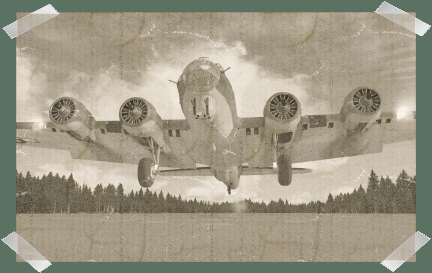
“Yes,
sir, he sure is. I’m going to be one someday too.”
*
*
*
The
setting:
October, 1924…a farm pasture somewhere in the American
south-east…
Twelve year-old Billy Elliot watched, mesmerized, as the
fabric covered bi-plane glided down toward his father’s
big pasture. Its engine was cutting in and out, running
for a few seconds at a time as a little more gasoline
made it through the iced up carburettor… He could make
out the lettering “US Air Mail” on the big flat side of
the fuselage…
End
Back
to John's Section Home
Works best in!

|